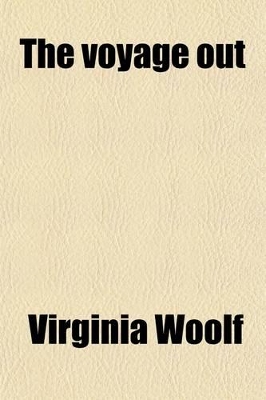Reviewed by brokentune on
St. John had just come through the swing door. He was rather blown about by the wind, and his cheeks looked terribly pale, unshorn, and cavernous. After taking off his coat he was going to pass straight through the hall and up to his room, but he could not ignore the presence of so many people he knew, especially as Mrs. Thornbury rose and went up to him, holding out her hand. But the shock of the warm lamp-lit room, together with the sight of so many cheerful human beings sitting together at their ease, after the dark walk in the rain, and the long days of strain and horror, overcame him completely. He looked at Mrs. Thornbury and could not speak.
Every one was silent. Mr. Pepper’s hand stayed upon his Knight. Mrs. Thornbury somehow moved him to a chair, sat herself beside him, and with tears in her own eyes said gently, “You have done everything for your friend."
Ok, please don't look at my rating for The Voyage Out and think that I hated the book. I really didn't.
In fact, I found much to love about the book and a whole new appreciation for Woolf when reading the story. I also really, really want to read her other books now, even The Waves, and I definitely want to re-read Mrs. Dalloway.
For one thing, I'm absolutely blown away that Woolf wrote this in 1912 then edited the book and essentially censored herself until this edition was published in 1915.
1915! Think of it: We have discussions of women's suffrage, sexuality (in various forms), depression, suicide, the snobbishness of the English class structure, the value of art versus commerce or other, more rational and practical, pursuits, ... We have a story of a young woman becoming her own self, young men finding their purpose in life, older people reflecting on their journey, and so much more. All in all, The Voyage Out is a story of many rites of passage. It's fabulously intricate and connects its characters to each other and their surroundings.
The Voyage Out had addressed to many aspects that I have loved in most the the books that have become my favourites over the years. And again, this was published in 1915, which still makes me shake my head a little.
And yet, I cannot say that I loved this book, or even liked it a lot. I loved parts of it, but I also found the reading experience a struggle.
The plot of the story only reveals itself at the very end, which is a challenge for me as I love to see at least a hint of a plot when I read a book.
So, it is fair to say that the book is solely based on us getting to know and spend time with characters. This takes up a lot of time, and as much of the story takes place on a ship and in a hotel, there are lots and lots of characters. However, despite being amused that this is the book where Woolf first introduces that Dalloways (and Richard turns out to be a bit of an old lech - Woolf was much more sympathetic to him when she wrote Mrs Dalloway ten years later) it took me over half of the book to really care for the characters, except for Rachel, our MC, who was interesting from the start.
I also struggled with Woolf's writing. Not so much the flow or narrative style - she had not gone full-on stream-of-consciousness in this book - but the sheer verbosity of writing. Sure, there were some very beautiful passages and my paperback is lined with scribbles and highlights (I'm a scribbler. Get over it!), but it was hard work not to miss the really fabulous parts in the mass of words that seemed to serve little purpose or seemed go off to describe trivialities.
So, there we have it. The Voyage Out was a struggle, but I am glad I've read it. Now, I'm looking forward to getting to her 1929 work A Room of One's Own. I have a feeling that this will pick up many of the themes that The Voyage Out touched on and that Woolf felt she needed to cut for fear of being labelled too rebellious or modern at the time that The Voyage Out was written, and hence risk never being published again.
“We’re such lucky people,” she said, looking at her husband. “We really have no wants.”
Reading updates
- Started reading
- 30 October, 2019: Finished reading
- 30 October, 2019: Reviewed
